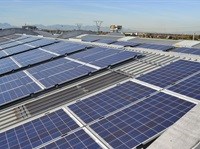
Top stories





EntrepreneurshipHow SMEs can build AI-ready businesses starting with the right technology foundation
Sudesh Pillay, WhyMAcForSME 3 hours

More news


















However, to grow its economy from a high manufacturing base, alternative sustainable energy solutions are being used to delink profitability and the consumption of non-renewable energy.
Gregor Küpper, MD of SolarWorld Africa, said: "Impala Clothing's factory in Maitland is the first photovoltaic power plant operating among Puma's suppliers worldwide."
The solar installation generates approximately 48MWh per annum and includes 131 solar panels installed on the rooftop of the plant in Cape Town. It is designed to feed directly into the building's power supply and consumed immediately in the factory, offsetting consumption of approximately 1150 tonnes of carbon over the lifetime of the system. This solution also replaces approximately 25% of future demand at the Maitland factory.
The project, which cost just under R1 million, was funded through the IDC's Green Energy Efficiency Fund in line with its goal to reduce reliance on coastal-based electrical power and introduce environmentally friendly production processes.
Since then, thousands of sport and lifestyle clothing items, manufactured under licence for Puma, have been created using solar energy.
William Hughes, a founding director of Impahla Clothing, said: "We are very satisfied with the solar system as we have not had any problems since the installation in 2011.While being an important contributor to reducing our electricity consumption costs, the installation of the solar system also plays an important role in maintaining our status as a carbon neutral factory. At the same time, we are one of the first factories in Africa to have geared our operations to the highest international standards.
Since 2006, Impahla identified six key issues relating to environmental sustainability:
Impahla monitors, manages and reports on its total carbon footprint: the amount of carbon it emits into the atmosphere as a result of its daily operations.
Impahla Clothing generated 56 942kW of power and saved 23% of the electricity usage at the Maitland plant for the period of 1 March, 2012, until 28 February, 2013, as recorded in its latest Integrated Annual Report.
| 2012 | 2011 | 2010 | 2009 | |
| CO2e per garment | 0.52 | 0.79 | 0.83 | 1 |
| CO2e per employee | 0.99 | 1.23 | 1.15 | 2 |
Impahla Clothing has also partnered Food & Trees for Africa (FTFA) to sponsor the planting of indigenous trees at schools in needy communities throughout the Western Cape. During 2013, a total number of 1492 trees were planted.
Solar energy is used where possible. A smart system ensures that all measures are identified to continue to reduce overall electricity consumption. The use of natural light is maximised through translucent roof sheeting to illuminate the factory floor and to provide natural heating during winter months, while employing large roller doors to create a cross-wind cooling effect in summer, thus reducing the reliance on electricity to create a favourable working environment. Energy-efficient light bulbs and fixtures are used in the factory.
Low-volume dual-flow toilets are used in all bathrooms. Hot water tanks are used in the kitchens. Independent water quality tests are conducted to ensure that waste water does not contain any harmful chemicals, and the water quality has been found to be safe for municipal discharge.
Working in partnership with Wasteplan - a national company specialising in recycling and responsible waste management - to recycle the plastics, paper and cardboard from the factory.
The use of Puma-approved CHT inks in all screen-printing and heat transfer processes, and environmentally friendly detergents (e.g. CD11).
Project Runway: One of the largest contributing items to the Impahla waste stream is fabric off-cuts, which unfortunately are not recyclable and have previously ended up in landfills. In order to find a sustainable alternative to this, WastePlan ran a competition with its staff to come up with ideas utilising the fabric waste. The result was Project Runway. Staff created many innovative and fashionable outfits, which were paraded up and down the "recycled" runway at WastePlan's plant in Kraaifontein, Cape Town.
William Hughes said: "Although we are a relatively small company, we believe it is within our scope of responsibility to monitor, manage and report on our total carbon footprint in the form of the amount of carbon we emit into the atmosphere as a result of our daily operations.
Our ongoing objective is continually to identify ways to reduce our overall carbon footprint and improve our processes and monitoring systems in relation to our usage of electricity, water, fuel, travel and waste, to improve our overall carbon efficiency."
For more, go to www.impahla.co.za